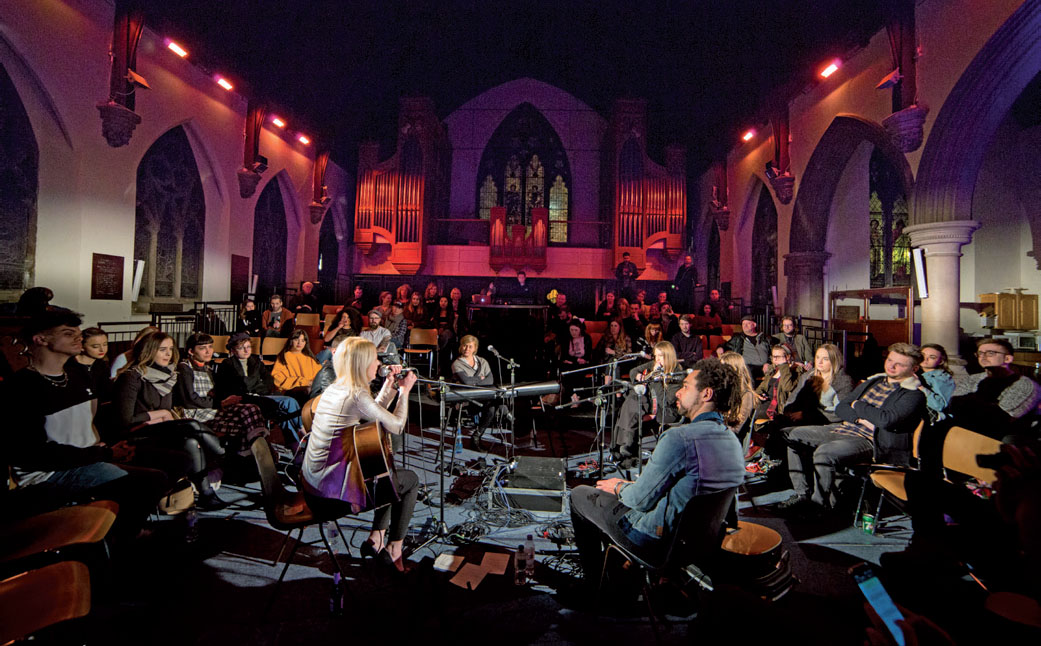
You may well have heard of the Institute of Contemporary Music in Kilburn, London. What you may not be aware of is the countless success stories, celebrities, and high-profile musicians who have walked the corridors of this impressive institution. Just recently, a tutor at the ICMP took Bohemian Rhapsody's Oscar-winning actor Rami Malek under his wing for singing lessons. Other alumni have included Clean Bandit's drummer Luke Patterson, The Vaccine's bassist Árni Höjrvar Arnason, The Script's bassist Ben Sargeant, and Radiohead's guitarist Ed O’Brien, to name but a few.
The ICMP offers a range of industry-aligned courses from music degrees, diplomas, and higher education programmes through to week-long summer schools. Guitar, bass, drums, vocals, songwriting, music production, and music business are among the popular choices of study. The main focus of all of these courses is to prepare students for a career in the music industry.
Matching up to its impressive alumni, the Institute is home to impressive facilities such as industry-standard recording studios, technology suites, and equipment such as Fender amps and Mapex drum kits. The ICMP stands out for its generous access to these facilities, seven days a week, at any time of day.
 © ICMP
© ICMP
Another ICMP's Songwriters' Circle
A global song
The ICMP is an incredibly diverse institution – 40% of its students are international. This international outlook is reflected in the trips it often organises. ‘We love the diverse community here at ICMP,’ says Sophie Daniels, head of songwriting courses at ICMP. The ICMP collaborates with other high-profile music institutions such as the Los Angeles College of Music, the University of Southern California, and the Vienna Music Institute. Students also visit Nashville, Tennessee where they see the Bluebird Café, spend time at Belmont University, and gain exposure to the more unusual routes into music such as composing music for games and films.
‘The international outlook is often one of the best things about attending a music school and we hope this continues at ICMP well into the future,’ adds Daniels. The future at home, of course, will likely be Brexit. However, both the government and ICMP have already guaranteed that current students, as well as students hoping to join ICMP in 2019, will be eligible for ‘home fee status’ throughout their course.
The ICMP's summer schools are a popular choice for those hoping to get to know more about ICMP and the exciting world of the music industry. ‘The summer school is great because it is so inclusive and you get to know all kinds of people,’ says Daniels. ‘Age range varies between anything from teenagers to mature students in their sixties. What makes the courses really special is the sense of community that comes with them. Everyone is there because they share a love of song. Participants don't care who they're in a room with – they are there to appreciate the common language of music and this makes for an inclusive and often emotional experience.’ During the songwriting summer course participants look at lyric writing, technique, and performance with specialists who are invited to teach and refine these skills. They have the opportunity to perform their own songs before the course ends with a gig showcasing the achievements of those taking part.
A particularly exciting event at the ICMP is the ‘Songwriters’ Circle’, which takes place monthly during term time. It presents performances by students and has previously featured guests including Frank Turner, Ben Earl, and Bruno Major. It is free for ICMP students and alumni to enjoy. During the sessions, the guest artists share their music ‘in its most stripped-back form’ and reveal personal insights into the creation of their lyrics and the song's composition.
Support
The ultimate aim of ICMP is to introduce its students to a career in the music industry and this doesn't come without a certain amount of pressure. The Institute provides a councillor, three different specialists, and workshops to support its students. All ICMP students have access to learn about aspects of their creativity which could affect their mental health. For example, students have the option of attending a masterclass on performance anxiety, which has been built into the curriculum. Mentors and specialists are also attached to different modules, projects, and even dissertations to ensure that students have support across all areas of their curriculum and in everyday life.
Daniels calls over a student wandering past on their lunch break, who amicably agrees to discuss everyday life at ICMP. That student is Hakeem Montague, who is currently studying a Master's in Songwriting following his completion of a BA at ICMP. ‘I have been here for five or six years and still every single day is like one incredible journey after the other,’ he says fervently. ‘Coming here is like a whole different world – I improve lesson after lesson. The teachers here support you, bring out the best in you, and do everything to ensure that you reach your potential.’
The ICMP application process is equally supportive – ‘Missed the January UCAS deadline? Don't worry!’ reads the application page on ICMP's website. The website provides an application form for interested musicians who have missed an application deadline and an advisor is on hand to discuss possible options. Although full-time course applications require auditions and interviews, they are ‘relaxed’ and free of charge. Additionally, a bursary of up to £50 is offered for undergraduate applicants who struggle to travel from home to the audition. To provide support throughout the academic year, bursaries are available to eligible applicants who have been offered a place on an undergraduate course.
‘The university environment couldn't be better,’ concludes Montague. ‘I could go on about it all day – it has literally changed my life. I used to lack confidence but thanks to ICMP I now have confidence in myself, in my music, and in my everyday life. I can't really recommend ICMP enough.’








